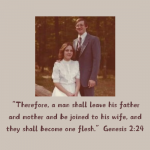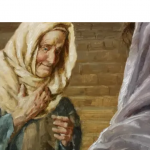“For My thoughts are not your thoughts,
Nor are your ways My ways,” says the Lord.
“For as the heavens are higher than the earth,
So are My ways higher than your ways,
And My thoughts than your thoughts.” Isaiah 55:8-9
Humbling, yet reassuring at the same time. God has control of the situation. He sees it from the beginning to the end. He understands the ramifications of each person’s actions. He knows what is best for me and you. And aren’t we thankful that He does. If we only had the wisdom of this world to rely on, it would be a much scarier place. No wonder so many people are dissatisfied, even fearful, of our current political leaders. They only have their wisdom to rely on. So much fear and stress and anguish and poor choices and evil actions can be eliminated when we understand these two verses in the Bible.
We are given examples of God’s wisdom over and over again as He chooses various people to do His work. Think about all the people who God has chosen throughout the Bible to do great things. Whether it is the youngest son of a family of many sons, the family’s shepherd boy, who became king. Or the 8 year old king who chose to serve God when God had been all but forgotten in the kingdom. There was the baby who had been sentenced to death but eventually was raised in the palace only to flee into exile to save his own life. Yet, God chose him to lead His people. These 3 are examples of people who did not at first appear to be great in the eyes of anyone but God used them to be leaders of His people — 2 kings and a leader like none other.
These were great men but what about those who were not so great. How about someone who was insignificant and helped God even though they pretty much remained insignificant…at least in the eyes of the world?
- Rahab the harlot — Joshua 2 and Hebrew 11:31 — She is listed among those great people of faith because she helped God’s people without knowing whether she would be saved or not. Not only was she saved but David was a descendant of hers. “By faith the harlot Rahab did not perish with those who did not believe, when she had received the spies with peace.”
- Mary the mother of Jesus — Luke 1:26-38 — A young girl (some say she was about 16 years old) who was told she would be the mother of the Savior of the world.
- Esther — the book of Esther — an orphan who eventually became a queen. May not sound insignificant but as queen she had no power or authority. She risked her life by even approaching her husband, the king. She not only approached him but requested that her people be saved from annihilation. Her actions saved the entire Jewish race.
- Jewish girl who helped Naaman — 2 Kings 5 — After following this young slave girl’s advice, Naaman, a commander in the Syrian army, said, “Indeed, now I know that there is no God in all the earth, except in Israel.”
All of these people have some things in common. They each did something very brave. They each did what they did to help someone else. They each are women. None became anything special because of who they were or what they did. No one else, and possibly even themselves, would have thought they would one day act in such a brave and bold manner. No one but God. He knew these women had what it took to carry out His desire. He knew that these women would act in accordance with His will.
How about two more? These two women saved an untold number of men. They stood up to the most powerful man on earth at that time. They not only defied his orders but they boldly admitted it to him. Their courage could have been rewarded by execution but they were not executed. They did what they did because they believed in God. These two women were Shiphra and Pua. Do you know what they did? Who they were? What part of the Bible you can find them in?
“Then the king of Egypt spoke to the Hebrew midwives, of whom the name of one was Shiphrah and the name of the other Puah; and he said, “When you do the duties of a midwife for the Hebrew women, and see them on the birthstools, if it is a son, then you shall kill him; but if it is a daughter, then she shall live.” But the midwives feared God, and did not do as the king of Egypt commanded them, but saved the male children alive. So the king of Egypt called for the midwives and said to them, “Why have you done this thing, and saved the male children alive?”
And the midwives said to Pharaoh, “Because the Hebrew women are not like the Egyptian women; for they are lively and give birth before the midwives come to them.”
Therefore God dealt well with the midwives, and the people multiplied and grew very mighty. And so it was, because the midwives feared God, that He provided households for them.” Exodus 1:15-21
As far as I know, this is the only place in the Bible that mentions Shiphrah and Puah but in this short passage it says quite a bit about them. Let’s take a close look at this passage:
“Then the king of Egypt spoke to the Hebrew midwives…”
Did you read that? The king himself spoke to the Hebrew midwives. He obviously had something very important for them to do. It was important enough to him that he wanted to speak to them himself.
“When you do the duties of a midwife for the Hebrew women, and see them on the birthstools, if it is a son, then you shall kill him; but if it is a daughter, then she shall live.”
Can you imagine being told to do such a thing? I think I would be terrified to be in the presence of a man who could even conceive of such a plan. To kill the most innocent is horrible. Of course, this king hoped that by eliminating the males of all the Israelites that he would be able to control them much easier. He hadn’t factored in the most important thing. Shiphrah and Puah were not terrified or, if they were, they did not act on their fear. Why? How could they stand strong in the face of such a cruel leader?
“But the midwives feared God…”
This is the source of their strength and the source of their courage. Shiphrah and Puah feared God. They knew that God’s wisdom was and is higher than the king of Egypt’s wisdom. Their fear of God was higher than whatever fear the king of Egypt attempted to create in them.
“…and did not do as the king of Egypt commanded them, but saved the male children alive.”
This fear in God caused them to “obey God rather than man.” No matter who that man was. No matter what he told them to do. Whether they delayed arriving at the home of the laboring momma or the laboring momma did not call the midwife in time or whether God hastened the delivery of the Israelite babies or whether all three of those worked together, the midwives did not follow the king of Egypt’s cruel command.
“And the midwives said to Pharaoh, ‘Because the Hebrew women are not like the Egyptian women; for they are lively and give birth before the midwives come to them.'”
Not only did these two midwives defy Pharaoh’s command, they stood up to him when he questioned them. These women, because of their fear of God, did not try to hide the fact that they disobeyed Pharaoh.
“Therefore God dealt well with the midwives, and the people multiplied and grew very mighty.”
What was the result of the midwives defiance to Pharaoh? The ultimate result was obtained — the Israelites multiplied and grew very mighty. These women were part of God’s plan to increase the size and might of the Israelites to prepare them for their great exodus from Egypt. God used these two women to accomplish His goal and they did not disappoint.
“And so it was, because the midwives feared God, that He provided households for them.”
But what about them? What did they gain? First of all, they didn’t do what they did to seek a reward. They did what they did because they feared God. But because they feared God and obeyed God, he rewarded them. Some believe that midwives of that time were typically barren women. To be given a household or a family would truly be a blessing in a society that prizes family.
What can we learn from Shiphrah and Puah?
- God values everyone — men, women, baby boys, baby girls.
- God chooses those who seem insignificant to do great things.
- Women can do great things for God in their everyday activities.
- Fearing God gives us strength and courage.
- God rewards those who faithfully serve Him.








Interesting thoughts on 2 Bible women I had not considered before – thank you😊!
Great story that we can learn from! To do God’s will should be in the fore front of our minds to be ready for whatever life Throws our way.